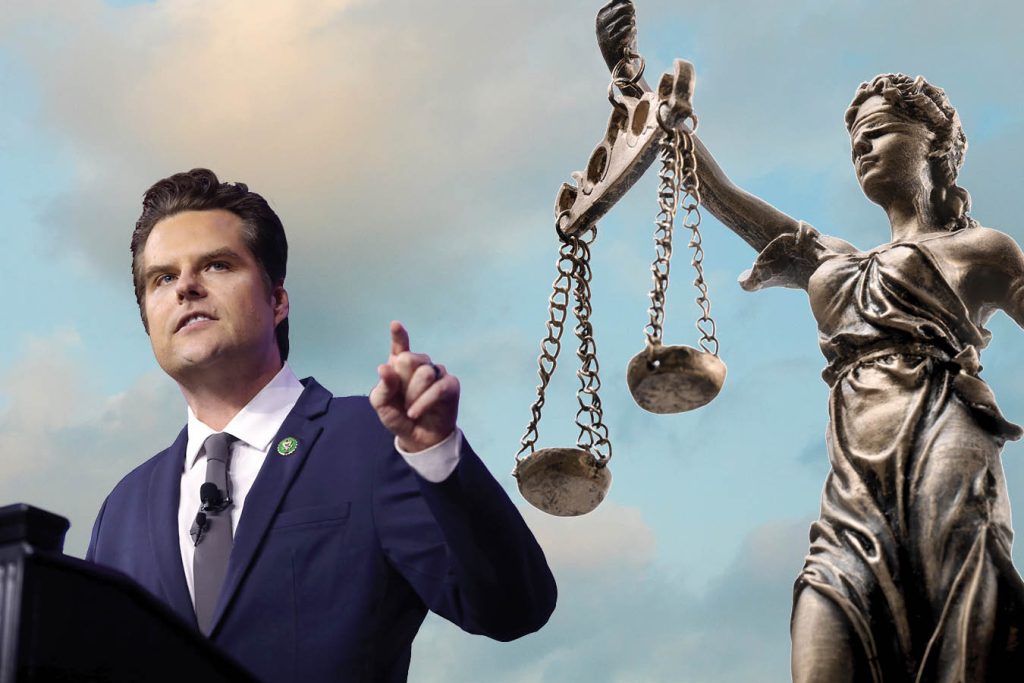President-elect Trump has ludicrously chosen just-resigned U.S. Rep. Matt Gaetz, an election denier, far-right ideologue and accused sex trafficker, as his pick to be the next attorney general of the United States.
The attorney general must uphold the Constitution without bias and defend the rights of all citizens equally. Gaetz’s track record includes prioritizing partisan and personal loyalty over lawful governance. As the nation’s chief law enforcement officer, the attorney general must be committed to fair justice for all, irrespective of political, religious or ideological leanings. Gaetz’s reputation for aligning justice with his personal religious agenda directly opposes this principle.
In August 2023, Gaetz introduced as a member of Congress the “National Prayer in School Act,” which was meant to encourage teachers and administrators to promote prayer with students in public schools. His official announcement of the bill included a quote promoting religion and denigrating LGBTQ people: “God’s reach does not stop at the schoolhouse gates. Our country’s education policy forbids students and faculty from praying while endlessly promoting degenerate LGBT and anti-white propaganda.” This prompted the FFRF Action Fund to not only call out his ill-conceived attempt to force religion on public schools but to name him as its Theocrat of the Week.
Although the pious Baptist son of a multimillionaire, Gaetz has been the subject of various morality accusations. His close associate Joel Greenberg was indicted, then found guilty and sent to prison in 2021 for crimes including the sex trafficking of a 17-year-old girl. Gaetz shrugged off the concerns by saying he is “not a monk” and has “paid for flights, for hotel rooms” for women he’s “dated” because he is “generous as a partner,” according to Vox. The Justice Department, in early 2023, ended its sex trafficking investigation into Gaetz without charging him with any crimes, according to his attorneys and congressional office. His resignation comes just days before the House Ethics Committee was set to release a “highly damaging” report regarding allegations that he engaged in sexual misconduct and illicit drug use.
The series of ethics and legal investigations that Gaetz has faced raise serious concerns. An attorney general must embody integrity, be above reproach, and be capable of maintaining public trust. While the FFRF focuses on ensuring government neutrality on religion, we also believe that public officials in key roles must be trustworthy stewards of the law. As attorney general, Gaetz would influence policies that impact the separation of church and state, including reproductive rights, LGBTQ-plus rights, and religious accommodations. Given his record, it’s likely that his decisions would reflect a disregard for secular governance in favor of an agenda that could impose religious ideologies on public policy. The attorney general must safeguard the legal rights of all citizens, irrespective of religion or belief, and enforce a just and secular application of the law. Gaetz’s inclination to conflate religious doctrine with legal policy would place fundamental freedoms at risk.
FFRF believes that our government should act as a shield for individuals from religious discrimination rather than a vehicle for religious privilege. Gaetz’s appointment would threaten our essential civil rights protections, as his political stance has often disregarded equal rights protections and supported policies that privilege certain groups over others. FFRF urges all Americans to advocate for an attorney general who will respect the boundaries between church and state and uphold the rights and freedoms of all citizens — free from religious or political interference.
“If there’s any justice in the world, Matt Gaetz will never come near the office of attorney general. His track record and extreme partisanship are precisely what we don’t need in a role meant to uphold fairness, equality, and the rule of law,” says FFRF Co-President Annie Laurie Gaylor.
The Freedom From Religion Foundation is a national nonprofit organization with 40,000 members and several chapters across the country. Our purposes are to protect the constitutional principle of separation between state and church, and to educate the public on matters relating to nontheism.


